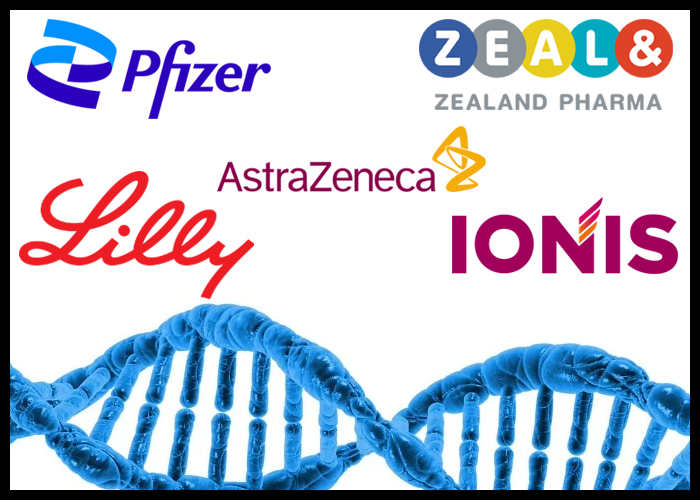
1. AstraZeneca’s COVID-19 Vaccine Demonstrates 79% Efficacy in U.S. Trial
AstraZeneca PLC’s (AZN) vaccine AZD1222 has demonstrated a statistically significant vaccine efficacy of 79% at preventing symptomatic COVID-19 and 100% efficacy at preventing severe disease and hospitalization in a U.S. phase III trial.
The US phase III trial, called D8110C00001, involved 32,449 participants aged 18 years or over who are healthy or have medically stable chronic diseases and are at increased risk for being exposed to the SARS-CoV-2 virus and COVID-19.
In participants aged 65 years and over, the vaccine efficacy of AZD1222 was 80%, added the company.
Co-invented by the University of Oxford and its spin-out company, Vaccitech and licensed by AstraZeneca, the vaccine also referred to as COVID-19 Vaccine AstraZeneca and Covishield, is approved for emergency use in more than 70 countries across six continents.
The vaccine is not approved in the U.S. yet. The company is preparing for the primary analysis to be submitted to the FDA for Emergency Use Authorization in the coming weeks.
Following reports of blood clots in people receiving COVID-19 Vaccine AstraZeneca, 13 European countries had temporarily paused vaccination. The UK and EU regulatory agencies, which have been investigating the side effects of the vaccine, reaffirmed last week that benefits of COVID-19 Vaccine AstraZeneca continue to far outweigh the risks. Some of the countries have resumed the use of the COVID-19 vaccine, following the assurance from the UK and EU regulators.
In other news, the company announced the passing away of José Baselga, Executive Vice President Oncology R&D, and member of its Senior Executive Team.
AZN closed Monday’s trading at $51.20, up 4.04%.
2. Ionis/Roche to Discontinue Dosing In Huntington’s Disease Trial
Shares of Ionis Pharmaceuticals Inc. (IONS) slumped over 20% in extended trading Monday, on news that its partner Roche has decided to discontinue dosing in a phase III study of Tominersen in manifest Huntington’s disease, dubbed GENERATION HD1.
Roche licensed Tominersen from Ionis in 2017.
An unblinded Independent Data Monitoring Committee (iDMC), which conducted a pre-planned review of data from the GENERATION HD1 trial recommended stopping the trial based on the investigational therapy’s potential benefit/risk profile for study participants.
While dosing will be paused in the open-label extension study of Tominersen, dubbed GEN-EXTEND, Roche intends to continue the Phase I pharmacokinetics/pharmacodynamics study of Tominersen, called GEN-PEAK, and its observational HD Natural History Study.
IONS closed Monday’s trading at $55.64, up 2.64%. In after-hours, the stock fell 20% to $44.51.
3. FDA Snubs Novo Nordisk
The FDA has refused to accept for review Novo Nordisk’s (NVO) supplemental New Drug Application seeking to expand the label of once-weekly Semaglutide to include 2.0 mg dosage for the treatment of type 2 diabetes.
The company has been asked to furnish additional information including data relating to a proposed new manufacturing site.
Novo Nordisk expects to resubmit the application to the FDA during the second quarter of 2021.
Semaglutide, under brand name Ozempic, is currently approved in the US in 0.5 mg and 1.0 mg doses for the treatment of type 2 diabetes in adults and to reduce the risk of major adverse cardiovascular events in adults with type 2 diabetes mellitus and established cardiovascular disease.
NVO closed Monday’s trading at $71.05, up 1.00%. In after-hours, the stock was down 1.48% at $70.00.
4. Will Pfizer/Lily’s osteoarthritis drug clear FDA Hurdles?
A panel of expert advisers to the FDA is scheduled to discuss Pfizer Inc. (PFE) and Eli Lilly and Co.’s (LLY) investigational monoclonal antibody Tanezumab, proposed for the treatment of chronic pain due to moderate-to-severe osteoarthritis, on March 24.
The briefing documents released Monday, ahead of the AdComm meeting, while concluding that Tanezumab 2.5 mg is superior to placebo for osteoarthritis (OA) pain, have also raised concerns regarding the risk of developing joint destruction (described as Rapidly Progressing Osteoarthritis [RPOA]) and abnormal peripheral sensation characterized as (predominantly) mild, self-limited mononeuropathy, with the most common manifestation being carpal tunnel syndrome.
The FDA has also noted that the companies’ proposed REMS is not sufficient to mitigate the risk of RPOA. The Risk evaluation and mitigation strategy (REMS) is necessary to ensure that the benefits of the drug outweigh the risks.
The final decision on Tanezumab 2.5 mg was initially expected in December 2020. However, last October, the companies were informed that the FDA’s review will extend past the December 2020 PDUFA date. A revised decision date has not been provided yet.
Tanezumab has been in development since 2004, has been studied across 41 clinical studies and the companies have had at least 43 formal meetings with the FDA related to this drug candidate.
Analysts are currently forecasting peak sales of $500 million for Tanezumab, if approved.
PFE closed Monday’s trading at $36.00, up 1.32%. In after-hours, the stock was down 0.03% at $35.99.
5. FDA Expands Label for Pacira’s Exparel
The FDA has expanded the label of Pacira BioSciences Inc.’s (PCRX) postoperative pain drug Exparel to include pediatric use, i.e., in children aged six and over, for single-dose infiltration to produce postsurgical local analgesia.
EXPAREL was approved for single-dose infiltration in adults to produce postsurgical local analgesia in October 2011 and for use as an interscalene brachial plexus nerve block to produce postsurgical regional analgesia in April 2018.
With the expanded approval, EXPAREL is the first and only FDA approved long-acting local analgesic for the pediatric population as young as age six.
For the full year 2020, the net product sales of EXPAREL were $413.3 million compared to $407.9 million in 2019.
PCRX closed Monday’s trading at $70.27, up 0.30%. In after-hours, the stock gained another 3.89% and was at $73.00.
6. Zealand’s Hypoglycemia Drug Wins FDA Approval
Zealand Pharma A/S’ (ZEAL) Zegalogue injection, proposed for the treatment of severe hypoglycemia in pediatric and adult patients with diabetes aged 6 years and above, has secured FDA approval.
Zegalogue, known generically as Dasiglucagon, will be available in both an auto injector and a prefilled syringe. In three pivotal trials in adults and children with diabetes, the median time to blood glucose recovery from severe hypoglycemia was 10 minutes following injection of 0.6 mg/0.6 mL Zegalogue.
Severe hypoglycemia is an acute, life-threatening condition resulting from a critical drop in blood glucose levels associated primarily with insulin therapy and is one of the most feared complications of diabetes treatment.
ZEAL closed Monday’s trading at $34.80, up 10.48%. In extended trading, the stock gained another 3.45% and was at $36.
7. Stocks That Hit New Highs
Organogenesis Holdings Inc. (ORGO) closed Monday’s (Mar.22, 2021) trading at $21.06, up 12.80%.
Theratechnologies Inc. (THTX) closed at $3.94, up 12.89%.
Instil Bio Inc. (TIL) closed at $26.80, up 1.36%.
Radius Health, Inc. (RDUS) closed at $25.77, up 14.64%.
Ortho Clinical Diagnostics Holdings plc (OCDX) closed at $19.67, up 5.61%.
For comments and feedback contact: [email protected]









